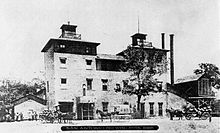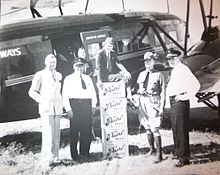Pearl Brewing Company
The Pearl Brewing Company was an American brewery in San Antonio .
history
Foundation to prohibition
In 1881 the JB Behloradsky Brewery was founded at 312 James Street and Avenue A. in San Antonio. Until 1883 it was known at times under the name City Brewery . In 1883 it was bought by a group of local businessmen who renamed it the San Antonio Brewing Company . Some of these business people were involved in the Lone Star Brewery as well. Otto Koehler, manager of the Lone Star Brewery, was named president. Since the brewery had been run by its predecessors with little economic success, the businessmen decided to raise capital and renovate the brewery by 1886. This year it resumed full production operations.
The brewery came under the control of the San Antonio Brewing Association , a parent company to which other business activities of the San Antonio Brewing Company also belonged. However, since these very similar names caused confusion among government, customers and business partners, it was decided to drop the name San Antonio Brewing Company completely and to run all business under the name San Antonio Brewing Association. The brewery kept this name until 1918. A number of customers still used the original name City Brewery - this was also due to the fact that early versions of the brewery logo still bore this title.
In 1886, the Kaiser Beck brewery from Bremen bought the rights and recipe for Pearl Beer, which at that time was still traded under the German word "Perle". According to the company's history, the name is derived from the bubbles that formed on the foam and the edge of the glass when a glass was poured. This beer was marketed as "Pearl Beer" on the US market and developed into the brewery's main brand in the following years. In 1889 the brewery was expanded again to keep pace with increasing demand.
In 1902 Otto Koehler left the Lone Star Brewing Company completely and became president of the San Antonio Brewing Association. Under his leadership, the Pearl Brewery grew from a small microbrewery to an industrial company. Koehler died in 1914 and his wife Emma took over the management of the brewery. She implemented several of the strategic plans her husband had formulated for the brewery. Annual output of 110,000 barrels was achieved within the next two years , making the brewery the largest brewery in Texas and dwarfing local rivals Lone Star Brewing Company.
Time of prohibition
During Prohibition , the company produced low-alcohol light beer ("near beer") and ice cream under the name Alamo Industries (1919–1921) . In addition, the company acted as a bottler for lemonades and ran a dairy, clothes cleaning, car repair shop and advertising company. It turned out, however, that the company was able to exploit its competencies primarily in the food sector: The clothes cleaning, car repair shop and advertising company were either closed or resold and the name of the company was changed to Alamo Foods Company (1921–1933).
When it was foreseeable that the prohibition laws would be repealed, regular beer was produced in stock so that deliveries could begin immediately after the end of prohibition. It is not clear whether the Pearl Brewery also brewed illegal full beer during Prohibition. With the end of Prohibition, regular operations were resumed and the name San Antonio Brewing Association was resumed. The San Antonio Brewing Association was the only San Antonio brewery to survive the prohibition era - the Lone Star Brewing Company went out of business and didn't come back on the market until 1940.
Despite the difficult market situation during the global economic crisis , President Emma Koehler managed to keep the company going. In 1940 she resigned from office - a nephew of Otto Koehler, Otto A. Koehler, became her successor. Emma Koehler acted as a consultant until her death in 1943.
Post war and expansion
After the end of the war, the Pearl brewery benefited from the general economic upswing: Pearl beer was already being distributed in large parts of the USA. In 1952 the brewery was renamed the Pearl Brewing Company after its product flagship . During the 1950s, the Pabst Brewing Company tried unsuccessfully to buy the Pearl Brewery.
In order to grow further, the company began to acquire breweries and brands: in 1961 the MK Goetz Brewing Company ( St. Joseph ) was bought. On the one hand, this was to function as a second production site and, on the other hand, as a new distribution center to open up new markets. At the same time the rights to Country Club Malt Liquor and Goetz Pale Near Beer were acquired. In 1970 the Pearl Brewing Company merged with the Soutdown Corporation ( Houston ) - the Pearl Aluminum Can Recycling Center and the Pearl Container Company were founded. Around this time, the rights to Jax Beer were purchased from Jackson Brewing Company ( New Orleans ).
In 1976 the St. Joseph site was closed and production was completely relocated to San Antonio. The following year, the Pearl Brewing Company was bought by the S&P Company ( Corte Madera ). In 1981, an annual output of 1,800,000 barrels was reached and Pearl Beer was distributed in 45 US states.
Sale and closure
In 1985 the Pabst Brewing Company bought the Pearl Brewery, and in 1998 Pearl went to the Stroh Brewery Company . When Pabst bought Stroh in 1999, the Pearl Brewery switched back to Pabst. On April 29, 2001, the Pearl Brewery was closed. At that time it employed 83 people. The rights to Pearl beer were sold to the Miller Brewing Company .
The Pearl Brewery buildings were bought by Silver Ventures, Inc. - most of them were either demolished, remodeled or renovated as residential complexes.
Trivia
- The Pearl Brewery used the self-proclaimed judge Roy Bean as an advertising character.
literature
- David G. Moyer (2009): American Breweries of the Past , Bloomington (Indiana): AuthorHouse, pp. 68–69 (English)
Web links
- Pearl: History , accessed December 20, 2015.
- Texas Breweries: Pearl Brewing Company , accessed December 20, 2015.
- The Handbook of Texas: Pearl Brewing Company , accessed December 20, 2015.





